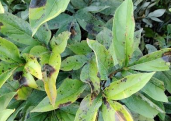As winter settles in, many plants and houseplants that were growing outdoors have returned inside. Before bringing in your plants, consider animal companions, such as dogs and cats, because some plants can make them sick if ingested. Knowing what plants you have and how they will affect your furry friends can go a long way in keeping your family safe.
Plants have several natural defenses to protect themselves against pests, including physical and chemical barriers. Physical barriers might be things like fine hairs on okra, prickles on cucumbers, thorns on roses, and spines on cacti. Chemical barriers are phytochemicals that can cause various issues depending on exposure and toxicity, such as irritation or illness. Bitterness is an example of a chemical barrier.
There are plants of concern for humans, and there is another list for pets. One example of a plant that is safe for human use but can make dogs and cats sick is aloe.
With both existing house plants or when bringing plants inside, there are some ways to limit exposure to keep both your plants and pets safe. Labeling plants is key, especially when making room for all your plants as you bring them in for winter.
- Keep non-pet-friendly plants in a room out of reach.
- Discard plant debris and clippings into an outdoor receptacle or one away from pets.
- Hang plants out of reach of pets.
- Label plants and use a sticker or label on plants that are unsafe.
- Use metal cages or terrariums for added protection if you are unable to separate by room.
The following list from University of Nebraska Extension covers plants that are poisonous to pets: Amaryllis, Andromeda, apple seeds, apricot, arrowgrass, avocado, bittersweet, boxwood, buttercup, caladium, castor beans, cherry pits, chokecherry, crown of thorns, daffodil, daphne. delphinium, dieffenbachia, elephant ear, English ivy, elderberry, foxglove, glory lily, hemlock, hemp, holly, hyacinth, hydrangea, iris, jasmine, Jimson weed, Kalanchoe species, laburnum, larkspur, laurel, locoweed, marigold, mistletoe, monkshood, mushrooms, narcissus, nightshade, oleander, peach, philodendron, Poinsettia, poison ivy, privet, rhododendron, rhubarb, stinging nettle, tobacco, tulip, walnut, wisteria, and yew.
The American Society for the Prevention of Cruelty to Animals also has species-specific poisonous plant lists for dogs, cats, and horses. If a pet does consume a plant, contact your veterinarian immediately.
Download a Plant and Pet Safety infosheet or connect with your local Illinois Extension county office for more information.




